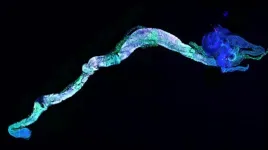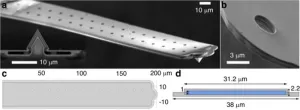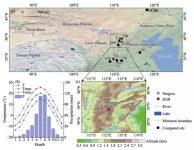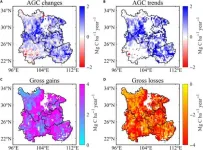Protein fragments ID two new “extremophile” microbes—and may help find alien life
2024-03-15
(Press-News.org) Perfectly adapted microorganisms live in extreme environments from deep-sea trenches to mountaintops. Learning more about how these extremophiles survive in hostile conditions could inform scientists about life on Earth and potential life on other planets. In ACS’ Journal of Proteome Research, researchers detail a method for more accurate extremophile identification based on protein fragments instead of genetic material. The study identified two new hardy bacteria from high-altitude lakes in Chile — an environment like early Mars.
Even though humans tend to avoid settling in extremely hot, cold or high-altitude areas, some microorganisms have adapted to live in such harsh locations. These extremophile microbes are of interest to astrobiologists who are searching for life on other planets. Researchers currently use individual gene sequencing to identify Earth-bound microbes, based on their DNA. However, current methods can’t distinguish closely related species of extremophiles. So, Ralf Moeller and colleagues investigated whether they could identify an extremophile by using its protein signature rather than a gene sequence.
The researchers started their demonstration with water samples from five high-altitude Andean lakes more than 2.3 miles above sea level in the Chilean Altiplano. (For reference, Denver is about one mile above sea level.) From the samples, the researchers cultivated 66 microbes and then determined which of two methods better identified the microorganisms:
Traditional gene sequencing compared the nucleotides of the 16s rRNA gene (a typical gene for sequence-based microbe analysis) from each sample to a database for identification.
The newer “proteotyping” technique analyzed protein fragments known as peptides to produce peptide signatures, which the team used to identify microorganisms from proteome databases.
With these methods, the researchers identified 63 of the 66 microorganisms that were cultivated from the high-altitude lake samples. For the three microorganisms that gene sequencing failed to identify because their genetic information wasn’t in the available database, proteotyping identified two potentially new types of extremophile bacteria. These results suggest proteotyping could be a more complete solution for identifying extremophile microorganisms from small biological samples. The team says protein profiling could someday help us search for and identify extraterrestrial life and better explore the biodiversity on our own planet.
The authors acknowledge funding from the Federal Ministry of Education and Research-Association of German Engineers and the Association of Electrical, Electronic and Information Technologies Innovation + Technology grant; German Aerospace Center; German Research Foundation; an Occitania Region grant; and the Volkswagen Foundation.
###
The American Chemical Society (ACS) is a nonprofit organization chartered by the U.S. Congress. ACS’ mission is to advance the broader chemistry enterprise and its practitioners for the benefit of Earth and all its people. The Society is a global leader in promoting excellence in science education and providing access to chemistry-related information and research through its multiple research solutions, peer-reviewed journals, scientific conferences, eBooks and weekly news periodical Chemical & Engineering News. ACS journals are among the most cited, most trusted and most read within the scientific literature; however, ACS itself does not conduct chemical research. As a leader in scientific information solutions, its CAS division partners with global innovators to accelerate breakthroughs by curating, connecting and analyzing the world’s scientific knowledge. ACS’ main offices are in Washington, D.C., and Columbus, Ohio.
To automatically receive news releases from the American Chemical Society, contact newsroom@acs.org.
Note: ACS does not conduct research, but publishes and publicizes peer-reviewed scientific studies.
Follow us: X, formerly Twitter | Facebook | LinkedIn | Instagram
END
[Attachments] See images for this press release:

ELSE PRESS RELEASES FROM THIS DATE:
2024-03-15
Most people know about solids, liquids, and gases as the main three states of matter, but a fourth state of matter exists as well. Plasma—also known as ionized gas—is the most abundant, observable form of matter in our universe, found in the sun and other celestial bodies.
Creating the hot mix of freely moving electrons and ions that compose a plasma often requires extreme pressures or temperatures. In these extreme conditions, researchers continue to uncover the unexpected ways that plasma can move and evolve. By better understanding the motion of plasma, scientists gain valuable insights into solar physics, astrophysics, ...
2024-03-15
Specialized nursing facility clinicians, or SNFists, may decrease the likelihood of nursing home residents experiencing stressful hospitalizations and improve the quality of life in their last days, according to researchers from Weill Cornell Medicine.
The paper, published in JAMA Network Open on Mar. 15, examined how SNFists uniquely impacted the care of nursing home residents in their last 90 days, compared with those cared for by other clinicians. This large-scale study is the first of its kind.
“The literature has described ...
2024-03-15
COLUMBUS, Ohio – Eating fatty food in the days leading up to surgery may prompt a heightened inflammatory response in the brain that interferes for weeks with memory-related cognitive function in older adults – and, new research in animals suggests, even in young adults.
The study, building upon previous research from the same lab at The Ohio State University, also showed that taking a DHA omega-3 fatty acid supplement for a month before the unhealthy eating and surgical procedure prevented the effects on memory linked to both the high-fat diet and the surgery in aged ...
2024-03-15
Adhesion GPCRs belong to the large family of G protein-coupled receptors (GPCRs). There are about 700 variants in humans, which are responsible for sensory impressions, hormonal cycles, controlling the cardiovascular system and more. GPCRs translate stimuli that hit a cell from outside into an intracellular biochemical signal.
The use of the fruit fly as a model animal allows researchers in this field to gain a deep understanding of human diseases, because the animals are genetically very similar to humans. Scientists estimate that around 75 per cent of the genes involved in human diseases ...
2024-03-15
The current theoretical model for the composition of the universe is that it’s made of ‘normal matter,’ ‘dark energy’ and ‘dark matter.’ A new uOttawa study challenges this.
A University of Ottawa study published today challenges the current model of the universe by showing that, in fact, it has no room for dark matter.
In cosmology, the term “dark matter” describes all that appears not to interact with light or the electromagnetic field, or that can only be explained through gravitational force. We can’t see it, nor do we know what ...
2024-03-15
A study introduces a novel method for calibrating the spring constant of FluidFM micropipette cantilevers, crucial for the accurate measurement of forces in microfluidic environments. This method addresses the limitations of current calibration techniques, offering a significant advancement in the field of force microscopy.
Fluidic force microscopy (FluidFM) combines the sensitivity of atomic force microscopy with microfluidics' capabilities, necessitating precise calibration of its cantilevers for reliable data. Traditional methods, however, struggle with the unique internal structure of FluidFM cantilevers, leading to ...
2024-03-15
A recent study published in the Journal of Geographical Sciences in December 2023 reveals a novel method for reconstructing historical warm season temperatures in North China. Utilizing the blue intensity (BI) of tree rings of Picea meyeri, researchers have developed a 281-year chronology, offering unprecedented insights into the region’s climatic past.
The escalating public concern over climate warming, due to its significant impacts on society, ecosystems, and the environment, underscores the importance of understanding long-term climatic conditions across different regions. As the limited observational records constrain our comprehensive grasp of climate change, tree-ring data prove ...
2024-03-15
Funding will prepare three scientists to improve sustainable development in their country
The University has won British Council International Science Partnerships funding of £180,000
The University already has close ties with the sustainability sector in the Philippines.
Aston University is to help tackle sustainability problems in the Philippines by offering training to three of the country’s early career researchers.
The University has won British Council International Science Partnerships funding of £180,000 to host three scientists ...
2024-03-15
A new study reveals a significant increase in aboveground carbon (AGC) in Southwest China from 2013 to 2021, defying the adverse effects of extreme droughts. This achievement underscores the region's pivotal role as a carbon sink, attributed to extensive ecological projects and innovative remote sensing techniques.
Over the past four decades, Southwest China has been a major carbon sink, significantly mitigating anthropogenic CO2 emissions. However, recent severe droughts, especially from 2009-2013 and in 2022, have drastically reduced its carbon ...
2024-03-15
About The Study: This study quantified the potential savings from eliminating or reducing physical activity disparities, which can help policymakers, health care systems, schools, funders, sports organizations, and other businesses better prioritize investments toward addressing these disparities.
Authors: Bruce Y. Lee, M.D., M.B.A., of Public Health Informatics, Computational, and Operations Research (PHICOR), CUNY Graduate School of Public Health and Health Policy in New York, is the corresponding author.
To ...
LAST 30 PRESS RELEASES:
[Press-News.org] Protein fragments ID two new “extremophile” microbes—and may help find alien life






